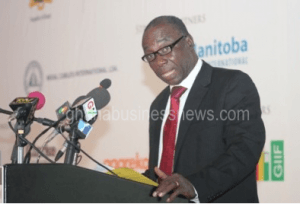Ghanaians to pay more for electricity in the future

The cost of electricity is expected to rise in the future as Ghana drifts from hydro-electric power, which is relatively cheaper, to thermal energy.
As government moves to address the energy crisis, which is attributable in part to low levels in the Akosombo and Kpong dams, the future of Ghana’s electricity will be thermal energy and a significant number of the thermal plants which will be powering Ghana, involve independent power producers (IPPs).
President John Mahama noted in August that “with the change in world climate and the lower and lower inflows into our hydro dams, hydro power will increasingly become a supplementary supply rather than our main source of power.”
Speaking on Thursday at the opening of “Powering Africa” – an energy investment summit in Accra, Dr Kwabena Donkor, the Minister for Power said that by December 2015, the Akosombo dam would constitute only 38 per cent of the Volta River Authority’s generation mix.
“We have had the benefit of legacy hydro that has enabled Ghanaian tariffs to be kept lower than prevalent in the sub-region. Unfortunately as demand expands by about 12 per cent per year, the role of legacy hydro diminishes and tariffs must now reflect the actual cost of service,” he said.
The minister also said that the leadership in Ghana’s power sector had identified the unattractive tariff regime as the underlying cause of the “historic underinvestment” in power generation, transmission and distribution, and was prepared to make tariffs more attractive for private sector participation.
“Let me ensure investors in the sector, both local and foreign that the tariff question is being addressed and that the Ghanaian state would not shy away from taking the tough decisions that need to be taken”, Dr Kwabena Donkor said.
Some private investors at the summit have indeed said that occasional interference in tariffs by government is not conducive for investment.
Admitting the power deficit in the country, the minister said Ghana has for the past months been going through what he called “power supply challenges leading to programmed load shedding owing to a number of reasons,” he said.
“But let me hasten to update you on the positive steps the Ghanaian State is taking to address these debilitating challenges. Recognizing that load shedding does not just affect economic performance, but draws into its negative net, social, political and psychological demerits, the State’s response has been segmented into the short, medium and long term,” he said.
In the short term, the minister said the government is bringing in a number of generating assets that include commissioning of the 220MW Kpone Thermal Plant operated by the Volta River Authority (VRA), commissioning the 110MW steam component of the TICO expansion, delivering the 250MW Ameri Energy gas thermal plant, bringing in the 225MW Karpower barge and completing the 110MW TAPCo steam unit and ensuring the the 180MW Phase Two (part 1) expansion of the Sunon Asogli project comes on line.
According to the minister, to further strengthen the fuel supply chain, having recognized that regular and reliable supply of fuel has been a contributory factor to the generation inadequacy, they are working on two liquefied natural gas (LNG) projects with the private sector to ensure adequate supply of gas to generating plants within the Eastern Enclave.
In the medium to long term, the minister said the government intends to add substantial capacity generation. “The Amandi and Jacobson projects should see financila closure by the middle of 2016,” he said.
He noted that actual construction on the 350MW CenPower project in Tema has commenced, and an additional 180MW should be available by June 2016 from the Sunon Asogli Expansion Phase Two (Part 2).
He stated that the APSL biomass project to generate 120MW in Atebubu and Sene Districts in the Brong Ahafo has commenced.
“In the long term we are working on expanding our generation mix to include coal powered generation (clean coal technology), increased emphasis on renewable sources as particularly the price of solar power comes down,” he said.
An Accra-based energy policy think tank, Africa Centre for Energy Policy (ACEP), said in July that the expensive thermal plants will require an adjustment in electricity tariffs of more than 60 per cent.
By Emmanuel K. Dogbevi & Emmanuel Odonkor
